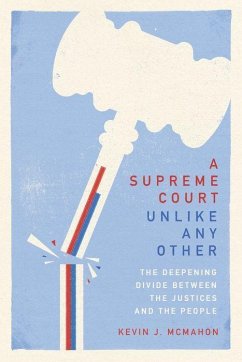"Today's Supreme Court is unlike any other in American history. This is not just because of its jurisprudence. It is because today's Court is uniquely distanced from the democratic processes that buttress its legitimacy. For example, five of the nine justices took their seats after winning confirmation with the support of senators who won far fewer votes than their colleagues in opposition, and three of these five justices were also nominated by a president who lost the popular vote. In A Supreme Court Unlike Any Other, Kevin J. McMahon explains the broad historical developments that have brought us here. Drawing on historical and contemporary data and deep knowledge of Court battles during presidencies ranging from Franklin D. Roosevelt to Ronald Reagan to Donald Trump, he offers new insight into the shifting politics of nominating and confirming justices, the changing pool of nominees considered for the Supreme Court, and the increased salience of the Court in presidential and congressional elections. A Supreme Court Unlike Any Other is an eye-opening account of today's Court within the context of US history and the broader structure of contemporary politics"--








